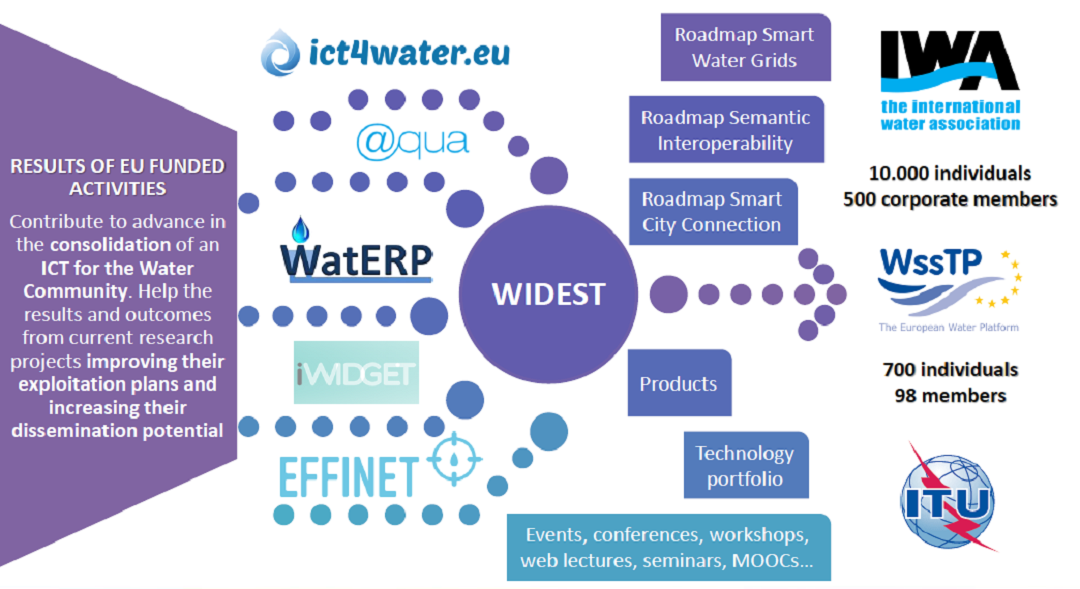WIDEST (Water Innovation through Dissemination Exploitation of Smart Technologies) is a European Commission (H2020 Coordination and Support Action) project.
The vision of WIDEST is to establish and support a thriving and interconnected Information and Communication Technology (ICT) for the Water Community with the main objective of promoting the dissemination and exploitation of the results of European Union (EU) funded activities in this area.

Once the project ends, the vision is twofold: in one hand, contribute to advance in the consolidation of an ICT for the Water Community that will be better informed, defined and integrated than today; on the other hand, WIDEST will help the results and outcomes from current research projects improving their exploitation plans and increasing their dissemination potential by delivering co-produced knowledge to a wide range of stakeholders and actors within the water community.
WIDEST will address these goals through five objectives which result in the main outcomes of the project:
-
Objective 1 (O1) Run an ICT for Water Observatory (IWO):
Consisting of literature search and reviews of relevant academic references, projects initiatives, industrial publications and any other dissemination channel where latest scientific & innovation advances could be reported. All the information collected will be analysed and adapted to the different target profiles of stakeholders to reach. Analysis of commercial developments to follow existing and emerging stakeholders and technology trends will be also conducted. In particular, special attention will be set in those results and developments giving answers to EIP on water priority areas and the policy implementation of water related directives (Water Framework Directive - WFD- and Flood Directive - FD, as main ones) and objectives of other EU water legislation.
Go to IWO -
Objective 2 (O2) Establish Common Dissemination Frameworks:
To support stakeholders identify and orient them to opportunities for applying new technologies within their system operations, together with the promotion of collaboration and sharing, articulate values and best practices, and assimilate sharing knowledge as an everyday experience. Common media such as guidelines, and other relevant topics supported with a website, social media platforms, and an online video channel to share knowledge of ICT for Water, fostering a connected ICT for the Smart Water Action Group.
See Links -
Objective 3 (O3) Organise Events:
Including conferences, workshops, and special sessions to encourage interaction between stakeholders and the public, host panel discussions on central issues for the roadmap, provide opportunities for interviews, and finally, sharing all the media and conclusions obtained with the community. Combined with O2, this objective should contribute to increase information/knowledge sharing among stakeholders. If information were shared among the various decision-makers and stakeholders, strategies could be coordinated, better decisions could be made, water supplies could be prioritised according environmental needs, overall water use efficiency could be improved, and water shortages could be reduced.
See News -
Objective 4 (O4) Produce four Roadmaps:
From a technical point of view, develop three Topical Roadmaps which have been identified by different European bodies (EIP and Expert consultations) as key technological challenges to be addressed within the ICT for water sector:
- "Semantic Interoperability and Ontologies" roadmap: Activities related to ICT applications for water management need to be clearly focused on interoperability. Governments need to develop a strategy for smarter water and help develop industry-standards to enhance interoperability of devices. According with this aim, a roadmap involving semantic interoperability and ontologies through dedicated information systems for water management will be developed.
- "Smart City Connection" roadmap: A city's water distribution and management systems should be equipped with the capacity to be monitored and networked to obtain information on how they are performing and affecting each other. Communication with population about possible shortages and other information is a key factor. Smart water strategies enable effective supply and demand management, and improve the effectively management of infrastructure done by utilities and business. Both strategies are aligned with the EIP on Smart Cities and Communities Strategic Implementation Plan.
- "Smart Water Grids" roadmap: In order to manage water scarcity and water conservation, a smart water network is needed. Smart water systems integrated with sensing technologies give water utilities advanced tools for more efficiently measuring water consumption and providing water customers with information to help them monitor their water usage and reduce costs. Leak detection and identification of non-water revenue are also key benefits of smart water meters and a smart water network. These are prospective technologies noted by the, and their further implementation are aligned with the together with the.
In parallel with the topical roadmaps, one Overall roadmap to analyse key issues and assimilate information across them, advice about effective implementation of the holistic approach and provide specific analyses and recommendations for policy makers and other readers, will be built.
See Roadmaps -
Objective 5 (O5) Produce a Portfolio:
It will contain effective ICT for Water technologies of varying readiness over its broad value chain, and propose the methodology to build, update and execute this portfolio (EIP smart technology priority area objective). The portfolio will be supported by O1, and at the same time, it will support O2 and O3. This task will be guided by a living, updated portfolio of effective technologies of varying readiness. The methodology to build, update and execute this portfolio will have to be developed and shared with EIP smart water technologies activities groups, contributing to EIP objective of increasing the EU export markets in smart water technologies by 25% and cost-efficiency by 30% by 2020. WIDEST will address these five objectives through coordination among stakeholders in the academic, public institutions, service providers, Non-Government Organisations (NGO's) and trade associations, business, industry, equipment manufacturers, utilities, government, consultants, regulators and non-profit sectors. The participant institutions are well known across different facets of Smart Water research, and have excellent connections with key stakeholders. Letters of support are provided from numerous academic and business stakeholders in the EU.